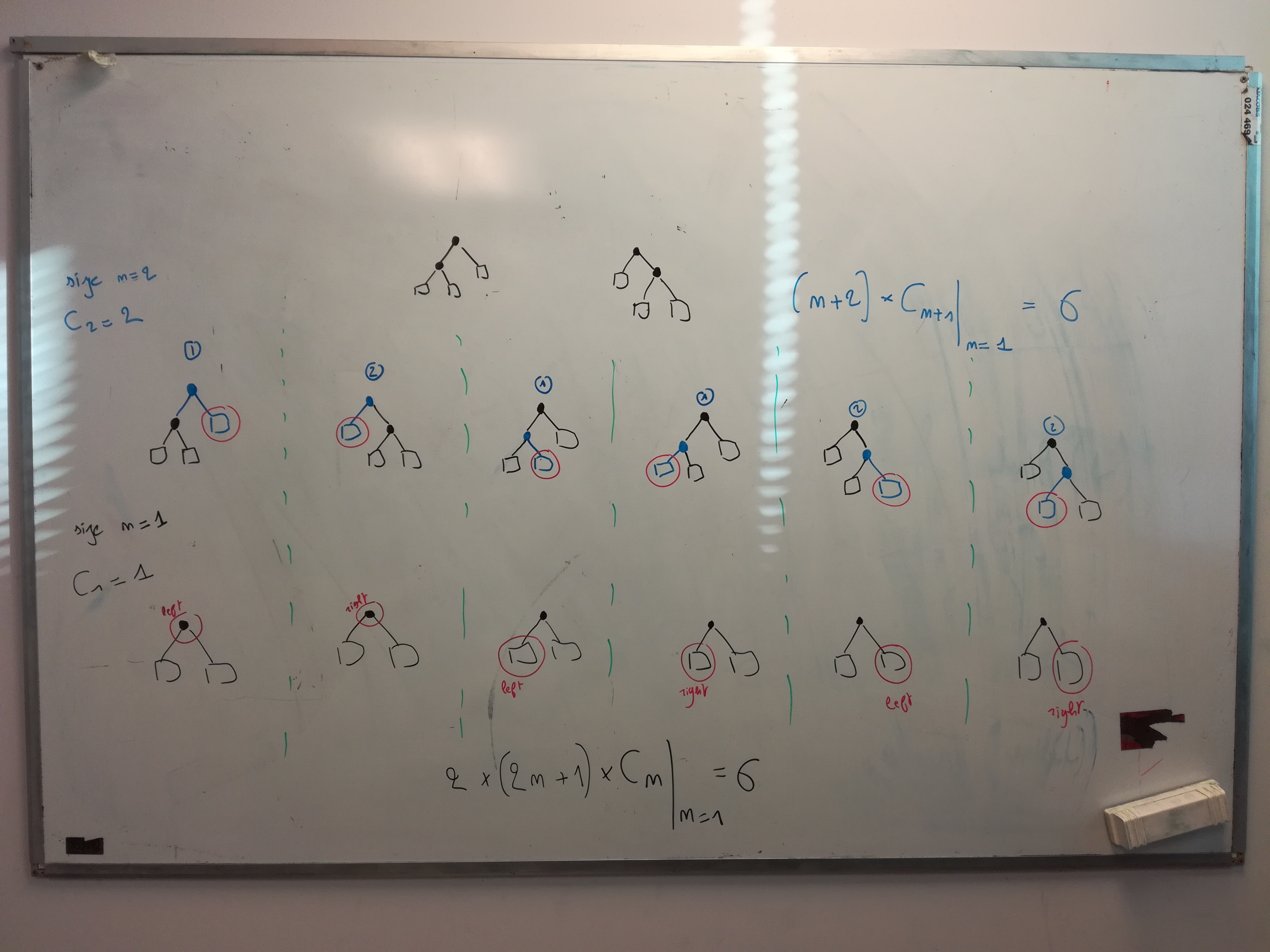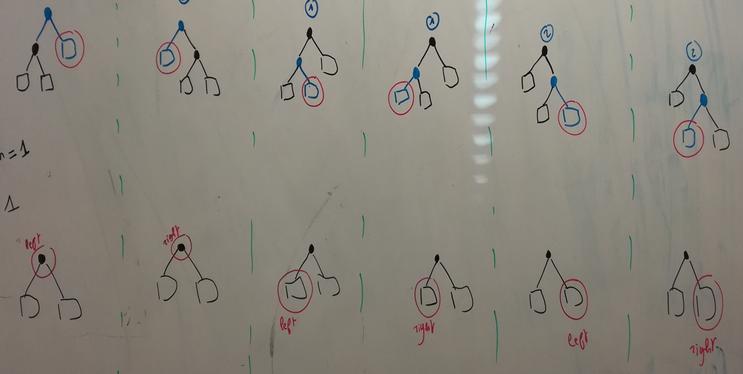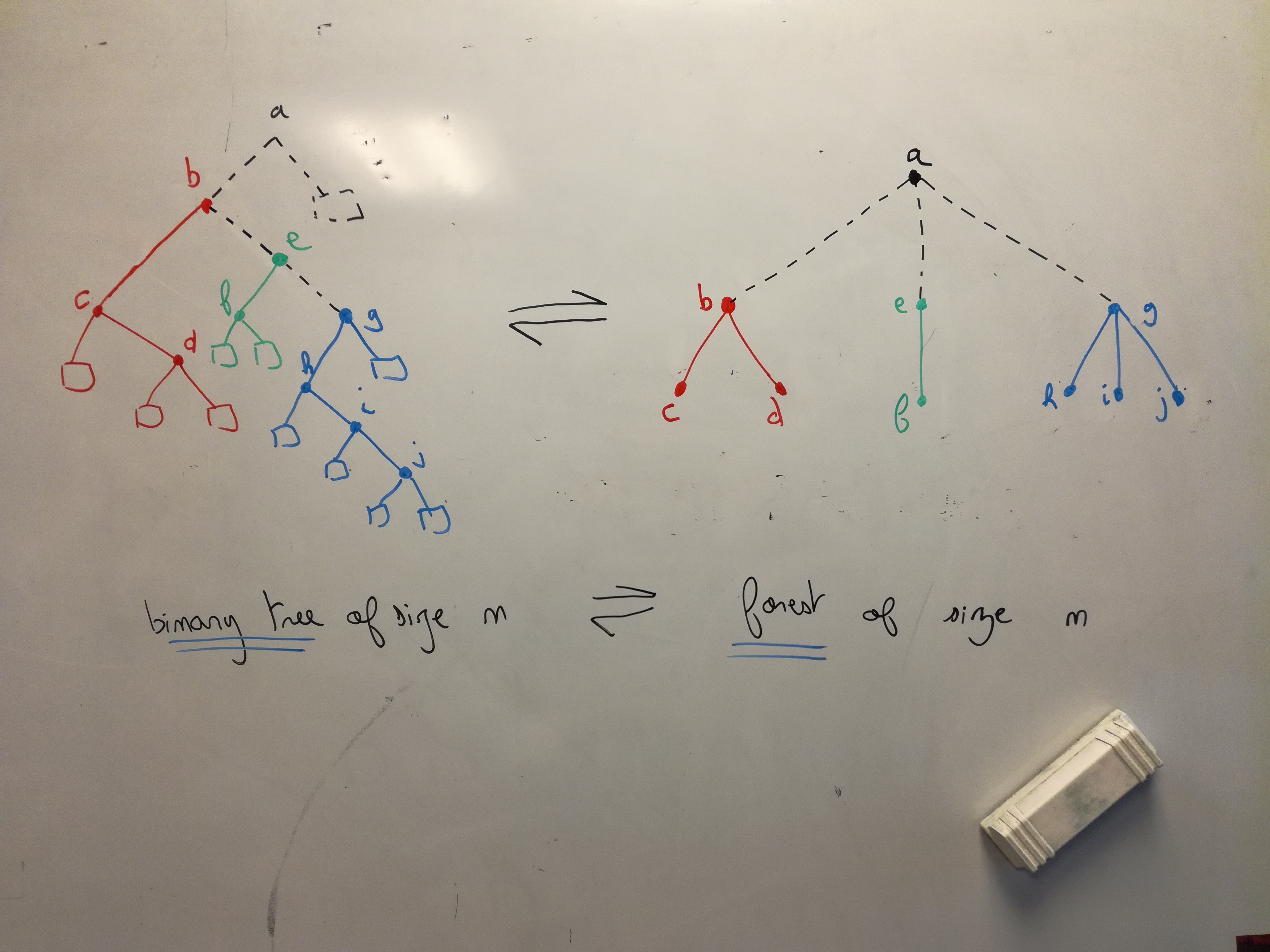Who am I? frederic.peschanski@lip6.fr — fredokun @ github
- associate professor at Sorbonne University (ex-UPMC)
- researcher at the Lip6 computer science laboratory
- (live) programming & maths geek
- long-time Lisper (scheme, CL, clojure(script))
(ns my.m$macros)
(require '[reagent.core :as r])
(require '[reagent.ratom :as ratom])

;; A live-coding presentation made with klipse
;; (thank you Yeonathan/viebel!)
(defn showme [s] [:h3 (str s)])
[:div (showme (js/Date.))]
Who am I? frederic.peschanski@lip6.fr — fredokun @ github
Remark: this presentation is a complement to the main presentation
about Boltzmann sampling.
Warning ! this presentation is code heavy! The whole source code is in the slides,
we’ll need to skip some parts (but you can play with the whole bunch online…)
(require '[clojure.test.check.random
:refer [make-random ;; create source with seed
split ;; two generators from one
rand-double ;; uniform double in range [0.0;1.0[
rand-long ;; uniform long (64 bits java, js ?)
]])
;; generate a double between 0.0 (inclusive) and 1.0 (exclusive)
(defn next-double [src]
(let [[src' src''] (split src)] ;; XXX: throw src?
[(rand-double src') src'']))
(next-double (make-random 424242))
"";; generate an integer in some range
(defn next-int [src mini maxi]
(let [[x src'] (next-double src)]
[(int (+ (* (- maxi mini) x)
mini)) src']))
(next-int (make-random 424242) 24 450)
"";; coin flips
(defn next-bool [src]
(let [[x src'] (next-double src)]
[(< x 0.5) src'])) ;; XXX: random bits leak !
(next-bool (make-random 424242))
""(require '[clojure.spec :as s])
;; a spec for binary trees (with keyword labels)
(s/def ::bintree
(s/or :tip nil?
:node (s/tuple ::label ::bintree ::bintree)))
(s/def ::label int?)
;; example
(def ex-btree [1,
[2 nil nil],
[3 [4 nil,
[5 nil nil]],
[6 nil nil]]])
(s/valid? ::bintree ex-btree)
""Random generation from spec (via test.check):
(require '[clojure.test.check.generators :as gen])
(gen/generate (s/gen ::bintree) 10)
""Observations
- non-uniform generation (it’s biased but don’t know how)
- lack of control: biased towards (very) small trees
Let's try the dedicated support for recursive structures
(def node-gen (fn [inner-gen]
(gen/tuple gen/int inner-gen inner-gen)))
(def bt-gen (gen/recursive-gen node-gen (gen/return nil)))
(gen/generate bt-gen 10)
""Observations
- non-uniform generation (it’s biased but don’t know how)
- lack of control: small-ish trees
Unbiased sampling means sampling in the uniform distribution.
Defined for a combinatorial class:
nCn of objects of a given sizen(/ 1.0 Cn)Binary trees as a combinatorial class:
n of a tree is its number of (internal) nodesCn?;; a point = a node or a tip (a `nil`)
(defn nb-points [n] (+ (* 2 n) 1))
;; a tip = a `nil` value
(defn nb-tips [n] (inc n))
;; counting binary trees (https://oeis.org/A000108)
(defn catalans
([] (cons 1 (cons 1 (catalans 1 1))))
([n Cn] (lazy-seq (let [Cn+1 (* (/ (* 2 (nb-points n))
(nb-tips (inc n)))
Cn)]
(cons Cn+1 (catalans (inc n) Cn+1))))))
(take 10 (catalans))
""nil ;; tree of size 0<academic-stuff>

</academic-stuff>
Incremental generation of a binary tree uniformly at random
(a.k.a. Remy algorithm)
Input: a tree of size n taken uniformly at random
i.e. obtained with probabilty (/ 1.0 (nth (catalans) n))
Example: [1 [2 nil nil] [3 nil nil]]
Step 1: we pickup a "point" (either a node or a nil) uniformly at random
⇒ we need a random integer between 0 and (* 2 n)
Example: we pickup the 4th point: [1 [2 nil <nil>] [3 nil nil]]
Step 2: We select a direction, either left or right
⇒ We need a random boolean (coin flip)
Example: :left
Step 3: We build the tree of size n+1 according to the bijection, and remove the "mark"
Example: [1 [2 nil [4 <nil> nil]] [3 nil nil]]
Finally, the generated tree is: [1 [2 nil [4 nil nil]] [3 nil nil]]
⇒ this tree has been taken with probability (/ 1.0 (nth (catalans) (inc n)))
(proof is easy thanks to the bijection… but let’s skip it)
Step 1 (pickup a "point") is O(n) if we use the "classical" representation of binary trees.
⇒ Alternative "vectorized" representation to achieve "almost" O(1)
(defn root [lbl]
[[lbl nil 1 2] #{0} #{0}])
(defn append-leaf [vtree lbl parent side]
(let [[_ _ pleft pright] (nth vtree parent)
pside (if (= side :left) pleft pright)
tip-idx (count vtree)]
[(-> vtree
(assoc pside [lbl parent tip-idx (inc tip-idx)])
(conj #{pside} #{pside})) pside]))
;; representation of [:a nil nil]
(root :a)
"";; [:a [:b nil nil] nil]
(-> (root :a)
(append-leaf :b 0 :left))
"";; [:a [:b nil [:c nil nil]] nil]
(-> (root :a)
(append-leaf :b 0 :left) (first)
(append-leaf :c 1 :right))
"";; remark: tail-recursive
(defn vbuild
([t]
(if-let [[lbl left right] t]
(vbuild (root lbl) 0 :left left (list [0 :right right]))
[]))
([vtree parent side t cont]
;; a node
(if-let [[lbl left right] t]
(let [[vtree' nparent] (append-leaf vtree lbl parent side)]
(recur vtree' nparent :left left (cons [nparent :right right] cont)))
;; a nil
(if-let [[[parent' side' t'] & cont'] cont]
(recur vtree parent' side' t' cont')
vtree))))
(vbuild [:a [:b nil nil] nil])
"";; the root is the only node with a `nil` parent
(defn search-root [vtree]
(loop [vtree vtree, idx 0]
(if (seq vtree)
(if (and (vector? (first vtree))
(nil? (second (first vtree))))
idx
(recur (rest vtree) (inc idx)))
;; not found
nil)))
;; a tail-recursive folder for vtrees
;; (let's skip the details...)
(defn vfold
([f init vtree]
(let [root-idx (search-root vtree)]
(vfold f init root-idx vtree '())))
([f init node-idx vtree cont]
(cond
(int? node-idx)
(let [node (nth vtree node-idx)]
(if (vector? node)
(let [[lbl _ left-idx right-idx] node]
(recur f init left-idx vtree (cons [::right lbl init right-idx] cont)))
;; tip
(recur f init nil vtree cont)))
;; continuation (tail-recursion)
(seq cont)
(case (ffirst cont)
::right (let [[_ lbl racc right-idx] (first cont)]
(recur f racc right-idx vtree (cons [::finish lbl init] (rest cont))))
::finish (let [[_ lbl lacc] (first cont)]
(recur f (f lbl lacc init) nil vtree (rest cont))))
:else ;; no more continuation
init)))
(vfold #(+ 1 %2 %3) 0 (vbuild [:a nil [:b [:c nil [:d nil nil]] [:e nil nil]]]))
"";; typical fold one-liner
(defn vunbuild [vtree]
(vfold vector nil vtree))
(vbuild [:a [:b nil nil] [:c nil nil]])
""Code size alert: grafting has several subcases
(let’s skip the details…)
(defn reparent [vtree parent old-child new-child]
(update vtree parent (fn [[plbl pparent pleft pright]]
(if (= pleft old-child)
[plbl pparent new-child pright]
[plbl pparent pleft new-child]))))
(defn newchild [lbl parent side other new]
(case side
:left [lbl parent other new]
:right [lbl parent new other]))
(defn graft [vtree lbl where side]
(let [wnode (get vtree where)
graft-idx (count vtree)]
(if (vector? wnode)
;; <<either a node>>
(let [[wlbl wparent wleft wright] wnode]
;; node case
(as-> vtree $
(if wparent (reparent $ wparent where graft-idx) $)
(assoc $ where [wlbl graft-idx wleft wright])
(conj $ (newchild lbl wparent side where (inc graft-idx))
#{graft-idx})))
;; <<or else a tip>>
(let [parent (first wnode)]
(-> vtree
(reparent parent where graft-idx)
(assoc where #{graft-idx})
(conj (newchild lbl parent side where (inc graft-idx))
#{graft-idx}))))))
""
(vunbuild (root :a))
""(root :a)
""(vunbuild (-> (root :a)
(graft :b 0 :left)))
""(defn rand-bintree [src nb size vtree]
(if (= nb size)
[vtree src]
(let [;; step 1: pickup a "point"
[pos src'] (next-int src 0 (dec (count vtree)))
;; step 2: choose side: left (true) or right (false)
[left src''] (next-bool src')]
(recur src'' (inc nb) size
;; step 3: apply bijection
(graft vtree (keyword (str (inc nb))) pos (if left :left :right))))))
(rand-bintree (make-random 424242) 1 20 (root :1))
""Observations
- uniform generation (we’ll see)
- controllable: the size parameter … is … the size of the tree
- efficient: generate quite large trees (linear time algo, tail-recursive)
The theory (analytic combinatorics) gives an asymptotic for the average height of binary trees.
(defn avg-height-theory [size]
(* 2.0 (Math/sqrt (* Math/PI size))))
(avg-height-theory 1000)
""Let’s check this …
(defn vheight [vtree]
(vfold #(+ 1 (max %2 %3)) 0 vtree))
(defn rand-bintrees [src size]
(lazy-seq (let [[vtree src'] (rand-bintree src 1 size (root :1))]
(cons vtree (rand-bintrees src' size)))))
(defn avg-height-practice [seed nb size]
(/ (reduce + 0 (map vheight (take nb (rand-bintrees (make-random seed) size))))
nb))
;; (time (avg-height-practice 14922 50 1000))
""(s/def ::gentree (s/tuple keyword? (s/coll-of ::gentree :kind vector?)))
(def ex-rtree [:1 [[:2 [[:3 []]
[:4 [[:5 [[:6 []]]]]]]]
[:7 []]
[:8 [[:9 []]
[:10 []]
[:11 []]
[:12 []]]]]])
(s/valid? ::gentree ex-rtree)Uniform random generation of general trees?
Yet another bijection.
<academic-stuff>

</academic-stuff>
Step 1 : generate a binary tree uniformly at random (size n)
(def mybtree (-> (rand-bintree (make-random 424242) 1 10 (root :1))
(first)
(vunbuild)))
mybtree
""Step 2 : convert it to a forest (size n)
(defn btree->forest [bt]
(if (nil? bt)
'()
(let [[lbl left right] bt
lefts (btree->forest left)
rights (btree->forest right)]
(cons [lbl (into [] lefts)]
rights))))
(btree->forest mybtree)
""Step 3 : add a root to obtain a general tree (size n+1)
(def mygtree [:0 (into [] (btree->forest mybtree))])
mygtree
""Observation
- the forest is generated uniformly for size n
- the general tree is generated uniformly for size n+1
(there is only one way to put the root node)
(defn rand-gentree [src size]
(let [;; step 1 : generate a binary tree uniformly at random
[vtree src'] (rand-bintree src 1 size (root :1))
btree (vunbuild vtree)
;; step 2 : convert to a forest
forest (btree->forest btree)
;; step 3 : add a root
gtree [:0 (into [] forest)]]
[gtree src']))
(first (rand-gentree (make-random 424242) 20))
""=> that's all folks!
powered by Klipse /